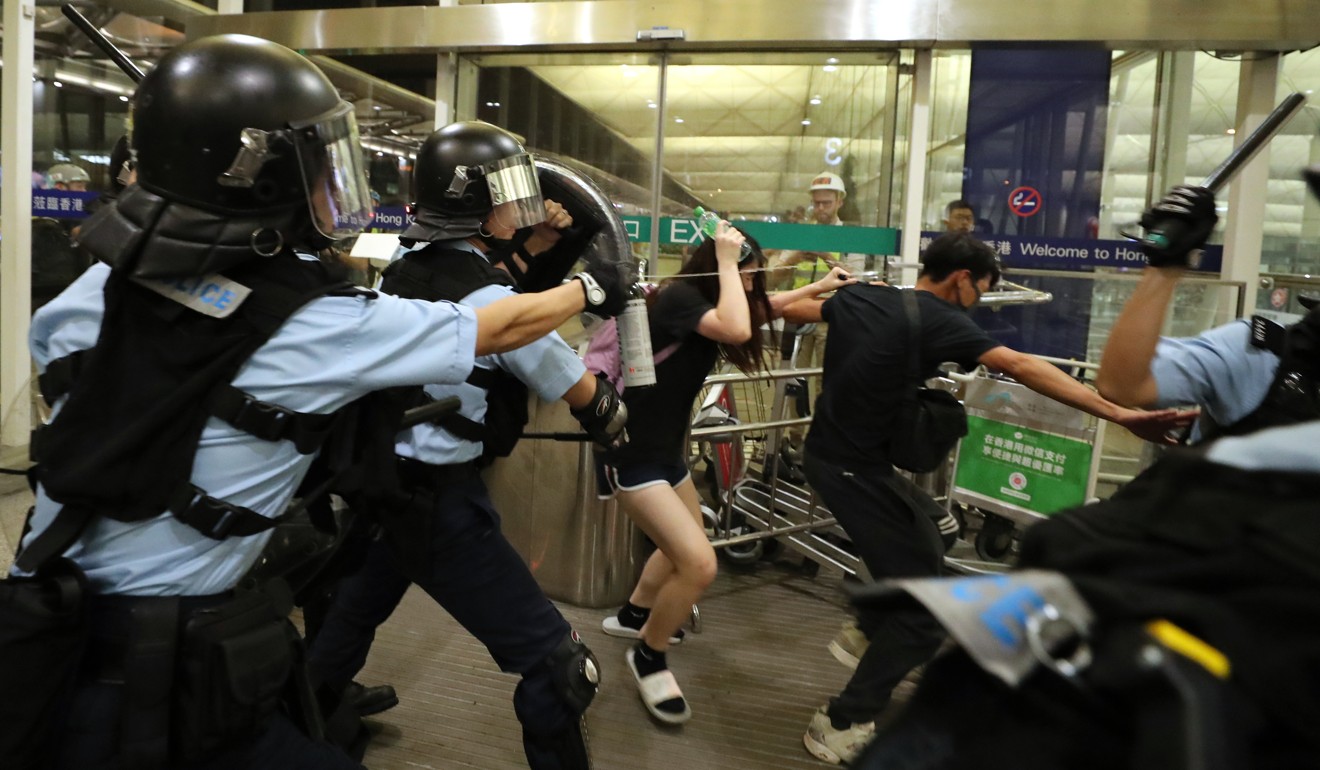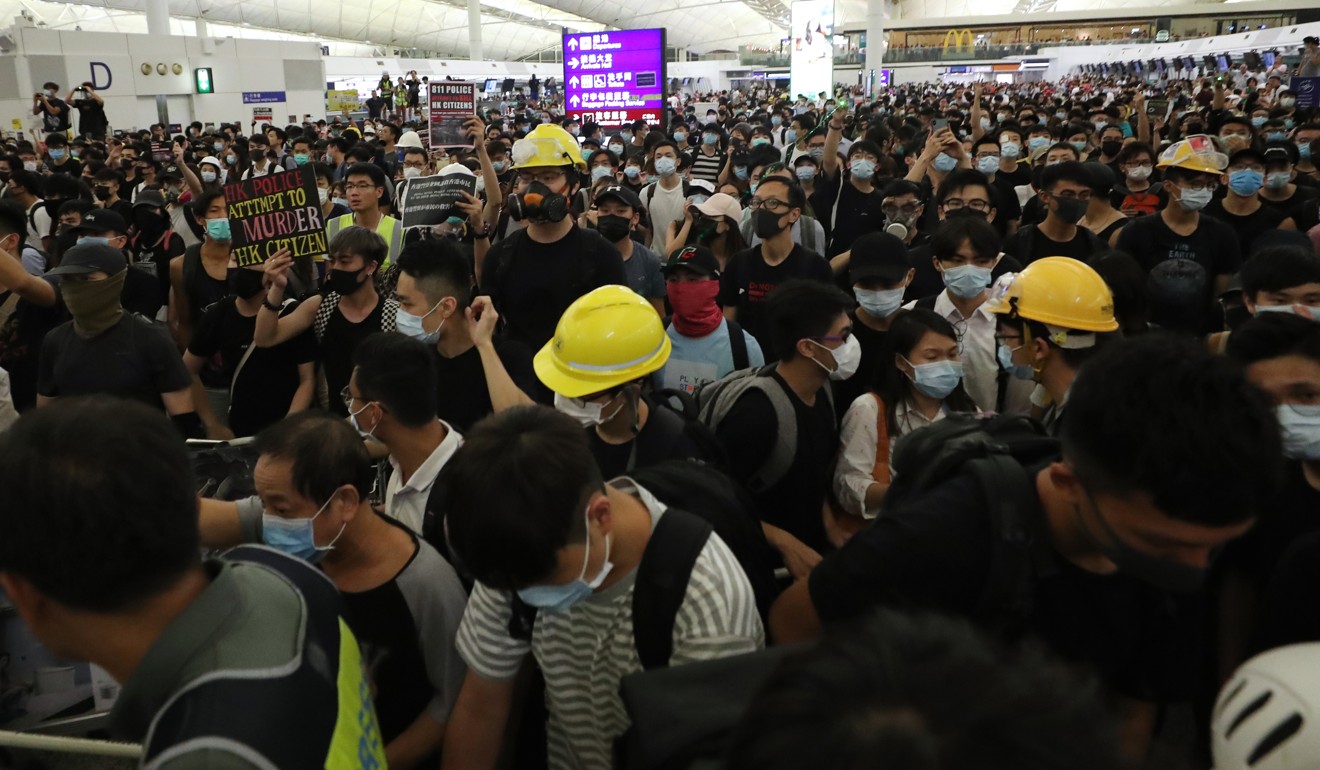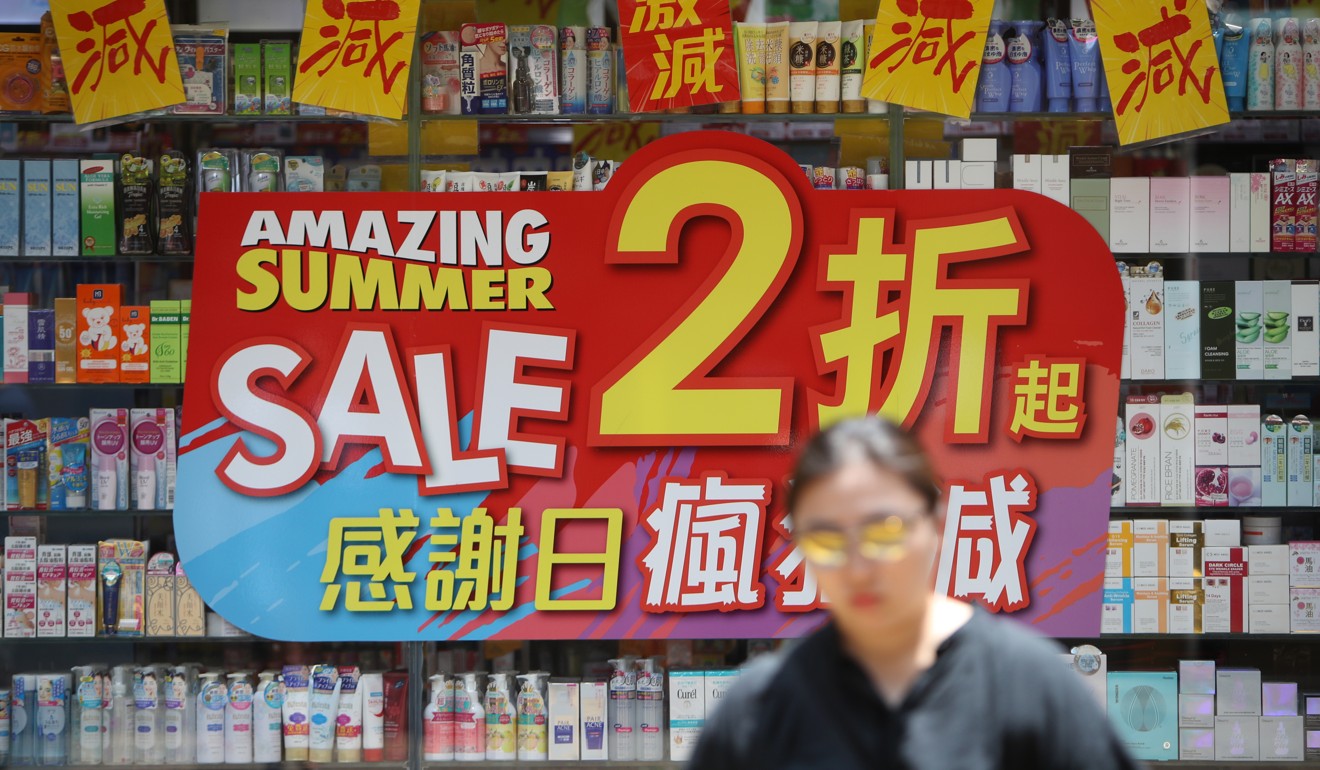Hong Kong’s core industries hammered by anti-government protest crisis with deep drops in retail, tourism and stock market
https://www.scmp.com/news/hong-kong/hong-kong-economy/article/3023985/hong-kongs-core-industries-hammered-anti
Hong Kong’s sweeping political turmoil and destabilising protests have eaten into the city’s core industries, with knock-on effects felt across the tourism, aviation and retail sectors, as well as the job market.
Hong Kong’s sweeping political turmoil and destabilising protests have eaten into the city’s core industries, with knock-on effects felt across the tourism, aviation and retail sectors, as well as the job market.
Economists on Thursday raised concerns based on a slow burn of alarming metrics: turnover of the stock market has tumbled more than 25 per cent since June, tourist arrivals are down 30 per cent, hotel prices have been slashed more than 50 per cent – and unemployment is on the rise.
At the same time, the city’s shops and restaurants are struggling to stay afloat, retailers are bracing for closures and lay-offs, and a major airline has adjusted to the fact that frightened visitors are
.
“We have seen the rippling effect of the protests on the economy, which exacerbated the already weak retail sector. Together with softened property and stock markets and higher unemployment recently, the outlook is not optimistic,” said Carie Li Ruofan, an economist at OCBC Wing Hang Bank.
“The magnitude of the damage to the economy depends on when the protests end.”
Australia’s Qantas airline said it would next month cut its passenger capacity for Hong Kong by 7 per cent and start using smaller planes.
Hong Kong’s flag carrier,
, warned of “significant impact” on revenue starting from August.
We have seen the rippling effect of the protests on the economy
“The Hong Kong market has taken a hit and we’ve seen volumes down in the immediate future by 10 per cent, and that’s people not travelling to Hong Kong,” said Alan Joyce, chief executive officer of the Qantas Group.
The government recorded a drop in tourist arrivals in July, compared with last year, and a 30 per cent fall in early August.
Hong Kong International Airport was occupied by protesters this month for six consecutive days, forcing the cancellation of nearly 1,000 flights over a two-day period.
Anti-government protesters have threatened to continue their activities until
agrees to their demands, including the formal withdrawal of the now-abandoned extradition bill and setting up an independent inquiry into the use of force by police.
The bill could have allowed criminal suspects to be extradited from Hong Kong to mainland China and other jurisdictions.

Riot police deploy pepper spray during a clash with protesters at Hong Kong International Airport on August 13. Photo: Sam Tsang
Tourism lawmaker Yiu Si-wing said hotel prices in Admiralty, Wan Chai, Causeway Bay and Tsim Sha Tsui – all areas scarred by recent protests – had been reduced by at least 50 per cent in August from a year ago. Some hotels had slashed their room prices by as much as 70 per cent, he said.
This means a five-star hotel room could cost below HK$1,000 (US$128) per night – the rate would be more than double that under normal circumstances.
Yiu said the occupancy rates at Hong Kong’s hotels had fallen to about 50 per cent, and he estimated that overall hotel revenue this month would plunge even further.
Shangri-La Asia, which operates four luxury hotels in the city, said one of its flagships had been “negatively impacted” by the
and occupancy at its Hong Kong portfolio was down to 82 per cent in the first half of 2019.
Upscale hotels in the Tsim Sha Tsui tourist district have taken to adjusting their staffing numbers to accommodate the downturn.
The InterContinental Hong Kong forced staff to go on unpaid leave, according to insiders, and the nearby
asked employees to take unwanted paid leave and holidays.
“I feel unhappy. It is summer, which should be very busy. This is all because of the protesters,” a Mira employee told the Post.
She estimated that one-third of the hotel’s nearly 100 housekeepers were asked to take leave after occupancy sank to between 50 and 60 per cent.

Protesters at Hong Kong International Airport on August 13. The demonstrations caused the cancellation of hundreds of flights. Photo: Sam Tsang
Mariana Kou, head of Hong Kong consumer research for investment house CLSA, said the performance of the city’s retail sector was likely to worsen in the third quarter.
“The overhang factor is the protests, which are evolving on a daily basis,” she said. “Even if the protests go away now, overseas visitors and tourists will take some time to regain confidence before returning to the city.”
Kou said it was difficult to recommend investing in retail stocks such as Sa Sa International and Lifestyle International because of the double threat of poor consumer sentiment and weak investor confidence.
have fallen drastically since June. At close of market on Thursday, shares in fashion house IT had slumped 31.4 per cent, Sa Sa was down 19.7 per cent and Lifestyle fell 19.5 per cent from June 1. During the same period, the city’s Hang Seng benchmark index lost 3.14 per cent of its value.
Local brand IT, which operates 221 shops in the city, forecast that it would take a net loss between March and August. Bonjour Holdings, the beauty and cosmetics chain, also warned of possible losses in the first half of this year.

Shops advertise discounts in Tsim Sha Tsui. One economist estimates retail sales will drop by as much as 10 per cent this year. Photo: Winson Wong
“In view of the various geopolitical and macroeconomic challenges, such as the Sino-US trade tensions and the recent social instability in Hong Kong, the group offers extra discounts to increase sales and reduce inventory,” said Sham Kar-wai, the chairman of IT.
Sa Sa, which has 118 outlets in the city and Macau, said sales at some stores in Hong Kong had slowed since protests started in June.
In the second quarter, the company’s turnover shrank 12 per cent to HK$1.58 billion. The company also reported a 12.9 per cent drop in transactions by
.
“Normally, this branch is crowded with people, including mainland tourists, but there are definitely fewer shoppers now because of the protests,” said a Sa Sa employee at a store near the busy Lan Kwai Fong district in Central.
We have written to all landlords to urge them to reduce rents for retailers for six months
Lifestyle, which operates Sogo department stores, offered a bleak outlook on the economy after the revenue its Causeway Bay branch fell 4.8 per cent in the first half of the year.
The Hong Kong Retail Management Association warned of closures and lay-offs if the dire situation continued across the retail sector.
“At this critical time, we have written to all landlords to urge them to reduce rents for retailers for six months,” the association said.
In Causeway Bay, some well-known eateries – including Kuen Fat Seafood Restaurant and Tsui Wah Restaurant – had closed for good after operating for decades in the tourist district.
Sunny Yeung, the owner of New New, a Chinese restaurant in the same area, said the number of
had dropped 70 per cent after the protests started, while overall customers were down 30 per cent, especially on weekend nights.
Even though we are not closed, not many customers are willing to come to a crowded area with bad traffic
“The marches always block roads and transport. Even though we are not closed, not many customers are willing to come to a crowded area with bad traffic,” Yeung said. “For our customers who used to drive and park their cars outside the restaurant, they no longer do that fearing their cars will be destroyed.”
Unemployment has also edged up. The latest government statistics show the city’s joblessness at 2.9 per cent in May-July, up from 2.8 per cent in April-June. It was the first increase in over a year.
“Poor unemployment means weakened wealth effect, which will trigger shoppers to tighten belts,” said Li, the economist.
She estimated the city’s retail sales would drop by as much as 10 per cent this year compared with an 8.7 per cent jump in 2018.
In Western District, where protesters
, business has almost flatlined.
Jeff Marcos, manager of Feather & Bone cafe, said during a typical weekend, the place was normally fully booked, but during two Sunday protests in July, half the customers cancelled reservations.
Those who did not cancel were mostly tourists and unaware of the pervasive unrest.
“It’s because we are near the liaison office and that’s the main target for the protests,” he said.
Additional reporting by Danny Lee and Athena Chan.



Post a Comment